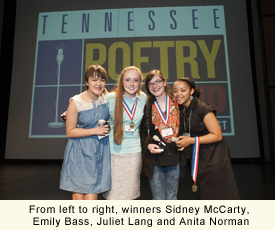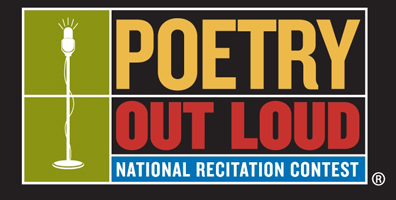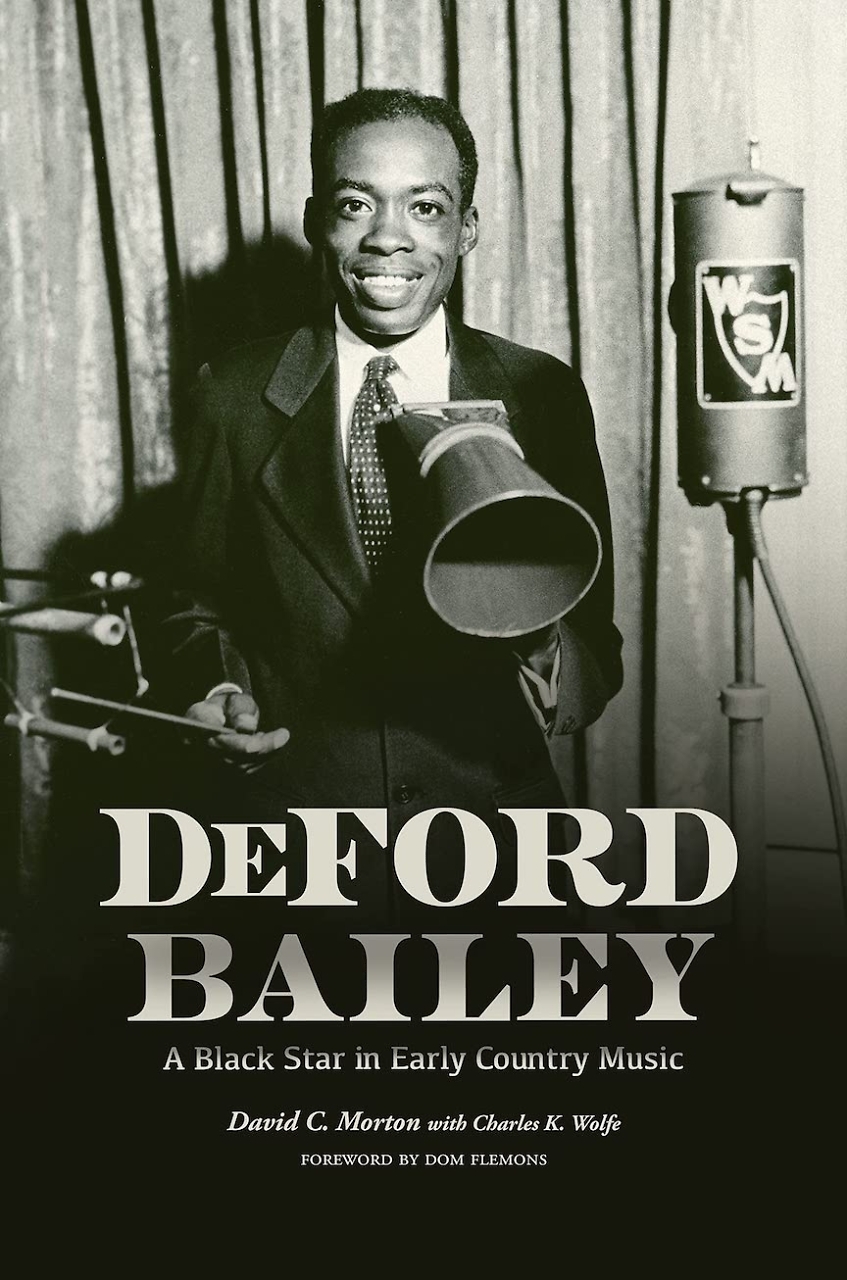Subtle but Powerful
Finding the heart of a poem at the 2014 Tennessee Poetry Out Loud state championship
To exercise restraint in reciting a poem might seem counterintuitive in the age of the poetry slam, in which writers delivery poems as theatrically as possible. In the national Poetry Out Loud recitation contest, however, the value of restraint is clear—so clear that it is written in unsubtle boldface type on the organization’s website: to avoid a low score, competing high-school students must refrain from “unnecessary emoting.” That mastery of emotions was what the audience witnessed on March 15 at Austin Peay State University in Clarksville as the 2014 Tennessee Poetry Out Loud State Championship unfolded. Twenty students recited poems with the gravity of understanding—side-stepping crescendos of feeling for a more diffused anger and a quieter grief.
 Anita Norman, a junior at Arlington High School near Memphis, understands this kind of control: she walked away the winner of this year’s state competition after reciting “Early Affection” by George Moses Horton. The poems she recited in the first and second rounds were “The Layers” by Stanley Kunitz and “Mourning Poem for the Queen of Sundays” by Robert Hayden. “I never want to overpower the words,” she said.
Anita Norman, a junior at Arlington High School near Memphis, understands this kind of control: she walked away the winner of this year’s state competition after reciting “Early Affection” by George Moses Horton. The poems she recited in the first and second rounds were “The Layers” by Stanley Kunitz and “Mourning Poem for the Queen of Sundays” by Robert Hayden. “I never want to overpower the words,” she said.
Norman is something of an old hand at Poetry Out Loud; the seventeen-year-old also won at the state level in 2012, when she was a freshman. On April 28, Norman will head to Washington, D.C., to compete in the Poetry Out Loud National Finals for a $20,000 award. As they were in the state contests, finalists in the national Poetry Out Loud contest will be judged in seven areas: physical presence, voice and articulation, dramatic appropriateness, level of complexity, evidence of understanding, overall performance and accuracy.
Christopher Burawa, author of The Small Mystery of Lapses and director of APSU’s Center of Excellence for the Creative Arts, is an award-winning poet from Iceland, and he was in the audience when Norman won the state competition. “Norman exemplified, I think, what they ask of students through this program,” Burawa said. “It’s not about being dramatic about the poem, but actually allowing the poem to speak through you. You can imagine it would be fairly easy for a student to overdramatize, to do an overly dramatic reading of a poem. She didn’t. She did something that was very subtle and powerful at the same time.”
 James Wells is the Arts Education Special Projects Coordinator with the Tennessee Arts Commission and coordinates Poetry Out Loud for Tennessee. Like Burawa, he was taken aback by the talent he witnessed on stage during the state competition. “It was breathtaking to see that high school students can put themselves in the poem and be able to execute it the way that I would think the poet intended,” he said. As for Norman, Wells credited her poise and her delivery for carrying her to victory. “She just has a will and a desire to get better,” Wells said. “And I think that translates on the stage in her performances.”
James Wells is the Arts Education Special Projects Coordinator with the Tennessee Arts Commission and coordinates Poetry Out Loud for Tennessee. Like Burawa, he was taken aback by the talent he witnessed on stage during the state competition. “It was breathtaking to see that high school students can put themselves in the poem and be able to execute it the way that I would think the poet intended,” he said. As for Norman, Wells credited her poise and her delivery for carrying her to victory. “She just has a will and a desire to get better,” Wells said. “And I think that translates on the stage in her performances.”
Norman was first inspired to enter the competition when her theater teacher played a video of Shawntay Henry, the 2008 Poetry Out Loud national champion, reciting Robert Hayden’s poem “Frederick Douglass.” Norman’s own talent has been nurtured by both her father, Edward Norman, and her teacher, Anne Terry. Her dad says that they work together, striving to “develop an authentic representation of the poem.” They also research and re-read poems together to ensure that she has an understanding of the material: “Sometimes they use words that we don’t use today and we’ll read those things together,” he said.
And when Anita Norman hits he stage, she does her father proud. “What I love seeing my daughter do is getting onstage,” he said. “Because I’m so involved, I get to see the work she has put into it.”
 But Norman credits her father’s work for her success, as well: “He’s so modest,” she said. “He has a strong musical background … and I think poetry is similar to music. He has a really good ear for what sounds good.” In fact, the two talk about poetry recitation in terms of music: staccato, crescendo, and decrescendo. “His having that interest, having the ear, made it really, really natural that we would work together,” she said.
But Norman credits her father’s work for her success, as well: “He’s so modest,” she said. “He has a strong musical background … and I think poetry is similar to music. He has a really good ear for what sounds good.” In fact, the two talk about poetry recitation in terms of music: staccato, crescendo, and decrescendo. “His having that interest, having the ear, made it really, really natural that we would work together,” she said.
While Norman’s interest in music informs her approach to poetry, Tennessee’s Poetry Out Loud runner-up, Sydney McCarty, came to poetry recitation through her interest in drama: now sixteen, she has acted in Clarksville’s Roxy Regional Theatre since she was ten years old. For her final round of competition, she chose “I felt a Funeral, in my Brain” by Emily Dickinson. “It’s all about how you can present a poem with the inflections of your voice,” she said.
“It’s so difficult to read Emily Dickinson’s poems out loud, and she did it perfectly,”Burawa said of McCarty’s interpretation. “Dickinson wrote these very short poems that go very deep very quickly, in terms of meaning and complexity. So there’s a lot going on in a very short period of time. And to be able to really do the poems justice requires maturity.”
McCarty was excited about participating in Poetry Out Loud from the moment her speech teacher informed students of the competition. “I was all about it,” she said. “Like, all year it was all I could wait for.”
Photos of the 2014 Tennessee Poetry Out Loud State Championship were provided by Theresa Montgomery/Tennessee State Photography.


